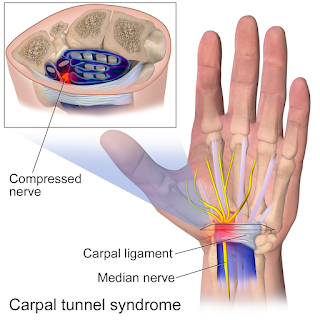What is Carpal Tunnel Syndrome?
First let’s understand: What is the meaning of carpal tunnel?
It is a nerve originating from the brachial plexus. It gives
sensation and movements to the thumb and three fingers. Any damage or trouble
to this nerve results in either pain, difficulty in movement or numbness or
loss of sensation in the areas supplying the arm.
As the carpal tunnel is not such a big passage even a small
injury can make the muscles and ligaments inflamed which in turn pinches the
median nerve located in its centre.
 |
Median Nerve pinched Image Source: wikimedia commons |
Carpal Tunnel syndrome is a condition that affects the wrist
and arms due to the compression of the median nerve which supplies the neck and
the upper extremities. Repetitive activities or movements of wrists and arms
can cause the carpal tunnel syndrome.
 |
| Image Source: Wikimedia Commons |
Whenever the bones in the wrist and hands are injured or swell due to any reason, it can reduce the tunnel space and thus the structures of tunnel exert more pressure on the nerve. This results in the compression of the median nerve which makes the fingers and thumbs move.
What are the signs and symptoms of Carpal tunnel syndrome?
· Difficulty moving your wrists.
· Difficulty holding things using thumb. Weaker grip.
· Tingling, burning, prickling or numbness sensation in the affected arm. Symptoms appear more at night than day. Sometimes the person may wake up in the middle of the night.
What are the causes of Carpal tunnel Syndrome?
In most of the cases the exact cause of the
syndrome is unknown. Some of the likely causes may be:
·
Genetics and previous history
·
Arthritis
·
Wrist fractures or other injuries
·
Pregnancy
·
Smoking
·
Alcohol overuse
·
Obesity or overweight
All these factors may be the likely reasons for carpal tunnel syndrome.
Few other risk factors may be:
· Women are more likely to develop this disorder
than men.
· Person employed as typists, golf players,
musicians or artists, masons etc. may have an extra risk of getting carpal
tunnel syndrome.
· Repetitive motions of wrist and arms can damage the muscles and ligaments. People engaged in jobs involving the constant use of hands in a repetitive pattern may be at risk.
How is carpal tunnel syndrome diagnosed?
 |
| Image Source: Pexels.com |
The symptoms are assessed by history taking and the wrists
and hands are checked for warmth, redness or swelling.
The wrist is flexed and extended to check the range of
motion and the reaction of the person. By tapping the inner side of wrist, a
physician may ask for the type of pain or sensation felt by the patient.
In severe cases the physician may advice an Electromyography to check the conditions of the internal structures of the wrist.
Can we prevent ourselves from having Carpal tunnel syndrome?
 |
| Image source: Pexels |
Exercise daily. Specifically do the wrist and arm exercises
so as to maintain the flexibility and strength of the muscles.
Try to lose the excess weight.
Take regular breaks in case your work involves the repeated
arm movements
Rest your wrists on soft surface. Placing them on hard
surfaces for too long may damage the internal structures or make them muscles
rigid.
Hold as much weight as your hands and wrists can tolerate.
Overexertion or overloading may damage the muscles and ligaments.
Learn the body mechanics appropriate for your work and apply
it in your daily life.
Take treatment of arthritis as per doctor’s advice so as to avoid getting carpal tunnel syndrome.
How is carpal tunnel syndrome treated?
Treatment:
It is not a serious problem and in many cases it heals in few
weeks but in case the condition is extremely intolerable, see you doctor to get
prompt treatment and care:
Home care tips for carpal tunnel syndrome:
Wear a splint as ordered by the doctor. This restricts wrist movements and relaxes the muscles.
 |
| Wrist Splint/brace Image source: wikimedia commons |
Apply ice on the inflamed or swollen area. It speeds up the
healing process
Continue the medications for any existing medical condition
without fail.
Learn various wrist and arm postures and range of motion
exercises.
Above all the main thing you need to know as a person suffering from carpal tunnel syndrome is to avoid extra strain on your wrist and arm muscles.
Give adequate rest and care to let it heal on its own.
Note: This blog post is for educational and informational purpose only. It is not a substitute for any medical advice, consultation or treatment. Please see your doctor in any case.

Comments